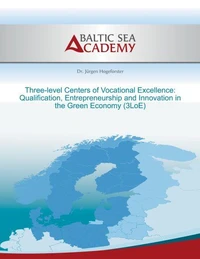- Accueil /
- . Baltic Sea Academy
. Baltic Sea Academy
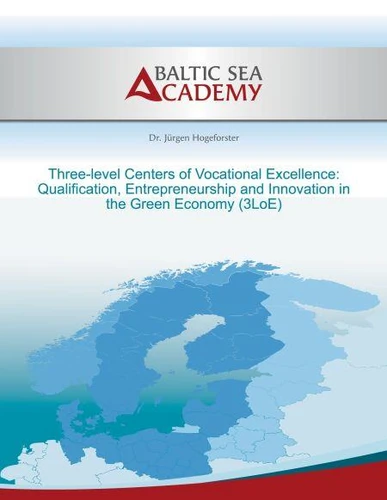
Dernière sortie
Three-level Centers of Vocational Excellence: Qualification, Entrepreneurship and Innovation in the Green Economy
Meeting the challenges in the fields of energy, climate and environmental protection requires comprehensive reorientation and forward-looking innovations. These tasks must be mastered by SMEs against the background of the following problems:
- blatant & growing shortage of skilled workers
- large qualification deficits, especially in the Green Economy
- loss of attractiveness & low qualification of school-based VET
- low rates of further training & insufficient orientation of offers to SME needs
- ageing of entrepreneurs & high, growing shortage of young people (demographic change)
- failure of business transfers & low rates of business start-ups
- low innovation rates & insufficient productivity
- not enough cooperation between universities and SMEs & a lack of teaching geared to SME needs
- comparably low internationalization of SMEs & many vocational training providers
To meet these challenges, 22 project partners from 7 countries and 70 associated partners from 13 countries have developed, operated and ensured the long-term continuation of eight centres of vocational excellence for the green economy.
The centres introduce dual education and implement a wide range of measures in vocational training, further education and higher education, which are developed, tested and evaluated in the project. The eight center developed and implemented 7 Train the Trainer programs, 59 vocational trainings, further education and study programs, 5 tools and support programs and 10 concepts and political strategy programs.
The educational measures cover Green Economy, Digitalization and Entrepreneurship. Vocational and educational counselling and innovation support for SMEs were developed and implemented.
The centres introduce dual education and implement a wide range of measures in vocational training, further education and higher education, which are developed, tested and evaluated in the project. The eight center developed and implemented 7 Train the Trainer programs, 59 vocational trainings, further education and study programs, 5 tools and support programs and 10 concepts and political strategy programs.
The educational measures cover Green Economy, Digitalization and Entrepreneurship. Vocational and educational counselling and innovation support for SMEs were developed and implemented.
Meeting the challenges in the fields of energy, climate and environmental protection requires comprehensive reorientation and forward-looking innovations. These tasks must be mastered by SMEs against the background of the following problems:
- blatant & growing shortage of skilled workers
- large qualification deficits, especially in the Green Economy
- loss of attractiveness & low qualification of school-based VET
- low rates of further training & insufficient orientation of offers to SME needs
- ageing of entrepreneurs & high, growing shortage of young people (demographic change)
- failure of business transfers & low rates of business start-ups
- low innovation rates & insufficient productivity
- not enough cooperation between universities and SMEs & a lack of teaching geared to SME needs
- comparably low internationalization of SMEs & many vocational training providers
To meet these challenges, 22 project partners from 7 countries and 70 associated partners from 13 countries have developed, operated and ensured the long-term continuation of eight centres of vocational excellence for the green economy.
The centres introduce dual education and implement a wide range of measures in vocational training, further education and higher education, which are developed, tested and evaluated in the project. The eight center developed and implemented 7 Train the Trainer programs, 59 vocational trainings, further education and study programs, 5 tools and support programs and 10 concepts and political strategy programs.
The educational measures cover Green Economy, Digitalization and Entrepreneurship. Vocational and educational counselling and innovation support for SMEs were developed and implemented.
The centres introduce dual education and implement a wide range of measures in vocational training, further education and higher education, which are developed, tested and evaluated in the project. The eight center developed and implemented 7 Train the Trainer programs, 59 vocational trainings, further education and study programs, 5 tools and support programs and 10 concepts and political strategy programs.
The educational measures cover Green Economy, Digitalization and Entrepreneurship. Vocational and educational counselling and innovation support for SMEs were developed and implemented.
Les livres de . Baltic Sea Academy
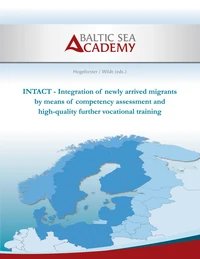
INTACT. Integration of newly arrived migrants by means of competency assessment and high - quality further vocational training
. Baltic Sea Academy, Jürgen Hogeforster, Christian Wildt, Max Hogeforster
E-book
9,49 €
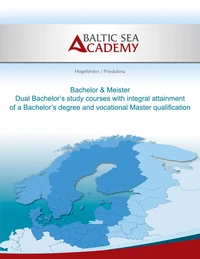
Dual Bachelor'a study courses with integral attainment of a Bachelor's degree and vocational Master qualification. Bachelor & Meister
Jürgen Hogeforster, . Baltic Sea Academy, Elina Priedulena, Max Hogeforster
E-book
9,99 €

Establishment of two - stage industry compe - tence centers of vocational education and training. ICC4VET
Christian Wildt, Hogeforster Jürgen, . Baltic Sea Academy, Hogeforster Max
E-book
9,99 €
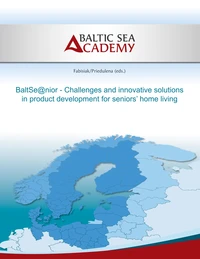
BaltSe@nior. Challenges and innovative solutions in product development for seniors home living
Elina Priedulena, Beata Fabisiak, Max Hogeforster, . Baltic Sea Academy
E-book
6,99 €
